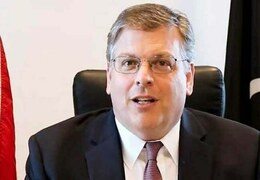 BRUSSELS: Leaders of the 17-nation eurozone are to hold a special summit March 13 to finalise efforts to avoid new debt crises, a diplomatic source told AFP on Tuesday.
BRUSSELS: Leaders of the 17-nation eurozone are to hold a special summit March 13 to finalise efforts to avoid new debt crises, a diplomatic source told AFP on Tuesday.
"It's not confirmed officially yet but it will be on March 13," said the diplomat who asked not to be named.
"It will be an informal summit of the 17 heads of state and government of the Eurogroup," the diplomat added.
The one-day Sunday summit will allow leaders to debate economic policies to be applied across the eurozone amid moves to fix flaws in the monetary union and boost rescue funds.
Euro leaders want to gather ahead of a full summit of the European Union's 27 nations March 24-25, due to take firm decisions on the size, shape and scope of a permanent rescue mechanism in response to the debt crisis that saw bailouts for Greece and Ireland last year.
First, the EU wants to free up its core rescue fund, the 440-billion-euro ($600 billion) Luxembourg-based European Financial Stability Facility (EFSF), to lend its full amount. At present some 200 billion euros must be kept in reserve as a cash guarantee against loans made.
Leaders will also consider letting the EFSF buy bonds from countries struggling to raise funds cheaply on markets, or lend the likes of Greece cash to buy back bonds that have already lost value.
But likely to top the March 13 talks is a proposal released last week by Germany and France for a pact aimed at harmonising key elements in fiscal and economic policy to prevent new debt crises.
Berlin and Paris announced the pact at a summit last Friday but eurozone countries were far from agreeing what should be in it. Divisions are sure to resurface when finance ministers gather for two days of detailed talks in Brussels from Monday.
In exchange for further aid to partner governments struggling to balance their books, Germany and France want shared policy goals and restrictions, which they say will make the eurozone a more competitive and efficient economy.
"We want to bring in a competitiveness pact and step by step bring about a more linear shared growth," German Chancellor Angela Merkel said alongside French President Nicolas Sarkozy.
Expressing instant opposition, Belgian Prime Minister Yves Leterme attacked a call in the proposals for inflation-linked wage rises to be abolished.
"We will not allow our social model to be undone," Leterme said.
Luxembourg Prime Minister Jean-Claude Juncker, who leads the Eurogroup of finance ministers, said: "I can't really detect a reason why abolishing the indexation of wages should improve the competitivity of my country or of the euro area."
As well as labour-market reform, the 17-nation currency area's major powers want convergence in corporate tax regimes.
That would have the effect of undoing the advantages secured by Ireland and others -- Dublin's low corporate tax rate of 12.5 percent came under considerable pressure during negotiations on its December bailout.
Other changes would see retirement ages evened out, qualifications recognised across linguistic borders to help labour mobility and a common system for managing banks in trouble.
The Merkel-Sarkozy plan envisages partners introducing ceilings on permissible national debt, mirroring a constitutional "brake" in Germany and new plans for France.
But with one in 10 unemployed across the eurozone amid massive cuts in public spending, the head of the European Trades Union Confederation said Germany and France were out to trample over the smaller countries.
"This is not a competitiveness pact, it's a perverse pact towards lower living standards, greater inequalities and more precarious employment conditions," said John Monks.
























Comments
Comments are closed.